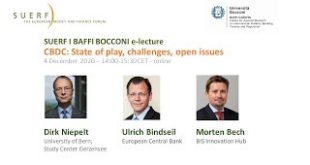On Fazit, Gerald Braunberger reviews the concept of “liquidity trap.” Keynes never used the term but Robertson did. Hicks introduced the common notion (represented, e.g., by a flat LM curve). Krugman talks about a different trap. So does Blanchard and he (incorrectly) attributes it to Keynes. So does Sinn.
Read More »Not Much Left of “Modern Monetary Theory”
Alberto Bisin (Journal of Economic Literature, December 2020) reviews Stephanie Kelton’s “The Deficit Myth: Modern Monetary Theory and the Birth of the People’s Economy:” Never is its logical structure expressed in a direct, clear way, from head to toe. … Some of these statements are literally correct but used for incorrect or misleading implications—plays on words, effectively. They seem taken directly from the book of tricks of the Greek sophists (the ones Aristophanes makes fun...
Read More »Discussion of Benigno, Schilling and Uhlig’s (2020) “Cryptocurrencies, Currency Competition, and the Impossible Trinity,” 2020, Bank of Canada
Discussion at the 2020 Bank of Canada Annual Economic Conference: The Future of Money and Payments: Implications for Central Banking. PDF.
Read More »“Dirk Niepelt im swissinfo.ch-Gespräch (Interview with Dirk Niepelt),” swissinfo, 2020
Swissinfo, December 14, 2020. HTML, podcast. We talk about CBDC, the Swiss National Bank, whether CBDC would render it easier to implement helicopter drops, and how central bank profits should be distributed.
Read More »“Optimally Controlling an Epidemic,” CEPR, 2020
CEPR Discussion Paper 15541, December 2020, with Martin Gonzalez-Eiras. PDF (local copy). We propose a flexible model of infectious dynamics with a single endogenous state variable and economic choices. We characterize equilibrium, optimal outcomes, static and dynamic externalities, and prove the following: (i) A lockdown generically is followed by policies to stimulate activity. (ii) Re-infection risk lowers the activity level chosen by the government early on and, for small static...
Read More »“Wirtschaftspolitik in Corona-Zeiten (Economic Policy in Times of Corona),” FuW, 2020
Finanz und Wirtschaft, December 9, 2020. PDF. Economic policy is not about GDP growth. It’s about welfare. Externalities are key. Infection externalities don’t go away by calling for responsible behavior. Infection externalities can turn positive. Keeping worthy companies or networks alive does not require government intervention, unless capital markets don’t work. To judge the right amount of burden sharing is beyond economics. But economics gives some clues: In an ideal world,...
Read More »SUERF BAFFI Bocconi Webinar – CBDC Niepelt Bech Bindseil – 20201204
In this SUERF-Baffi Bocconi Webinar, which took place on 4 Dec 2020, Morten Bech, Centre Head - Switzerland, BIS Innovation Hub, and Ulrich Bindseil, Director General Market Infrastructure and Payments, ECB, gave presentations on current work within their institutions on the development of CBDC. Dirk Niepelt, Professor at the University of Bern and Director of the Study Center Gerzensee, moderated an extensive and lively Q&A session with the over 200 participants. Themes covered: -...
Read More »The Economist on CBDC and Disintermediation
The Economist discusses the risk of CBDC-induced bank disintermediation. Their summary of the 2019 paper by Markus Brunnermeier and myself: If people prefer CBDCS, however, the central bank could in effect pass their funds on to banks by lending to them at its policy interest rate. “The issuance of CBDC would simply render the central bank’s implicit lender-of-last-resort guarantee explicit,” wrote Markus Brunnermeier of Princeton University and Dirk Niepelt of Study Centre Gerzensee...
Read More »“CBDC: State of Play, Practical Challenges, Open Issues,” SUERF Webinar, 2020
SUERF Webinar “CBDC: State of play, practical challenges, open issues” with Ulrich Bindseil (ECB) and Morten Bech (BIS). Moderated by Dirk Niepelt. December 4, 2020, 2 pm. Webinar website. Presentation by Morten Bech. Presentation by Ulrich Bindseil. CBDC = MM0GA.
Read More »“Monetary Policy with Reserves and CBDC: Optimality, Equivalence, and Politics,” CEPR, 2020
CEPR Discussion Paper 15457, November 2020. PDF (local copy). We analyze policy in a two-tiered monetary system. Noncompetitive banks issue deposits while the central bank issues reserves and a retail CBDC. Monies differ with respect to operating costs and liquidity. We map the framework into a baseline business cycle model with “pseudo wedges” and derive optimal policy rules: Spreads satisfy modified Friedman rules and deposits must be taxed or subsidized. We generalize the...
Read More » Dirk Niepelt
Dirk Niepelt

